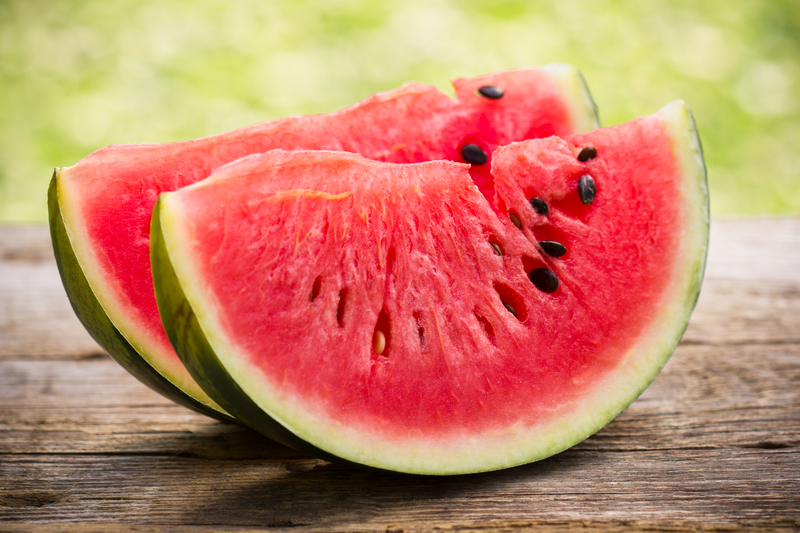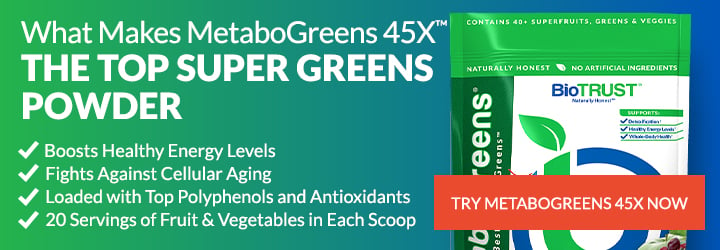Is Watermelon Good For You? See 7 Benefits of Watermelon

– Janet
A: Oooh… I’m right there with you, Janet! There’s nothing like a sweet, juicy watermelon! And no, please don’t give up on watermelon. While it has been (undeservedly) maligned as just empty calories (or simply sugar water), watermelon indeed has much to offer beyond flavor—it packs quite a nutritious punch!
Let’s look at just some of the many benefits of watermelon.
Health Benefits of Watermelon
1) It’s delicious and satisfies cravings for sweets. I think we both agree on that one. And if you have a hankering for something sweet, just think about all the other (less nutritious) options you’re bypassing when you reach for a slice of Citrullus lanatus (that’s the official name for watermelon) instead.
2) It’s rich in water. When it’s hot, you’re at a greater risk of dehydration—especially if you are more active. You already know the importance of ensuring your body is hydrated. Of course, drinking water is a great way to stay hydrated, but it’s not the only way. You can also get water from the foods (and non-water drinks) you consume.
Watermelon has an exceedingly high water content; it’s 92% water, in fact. That water content not only helps you stay hydrated, it can also help you feel full. Plus, watermelon provides just over a gram of fiber per wedge, which doesn’t exactly make it a high-fiber food, but every gram adds up. With its slim calorie count of just 87 calories per wedge—or 46 calories per cup—that makes watermelon a “low energy-dense” food, which simply means you get to consume a lot of food (volume) for a relatively paltry number of calories. Simply put, watermelon is a worthy indulgence.
3) It provides plenty of nutrients. Many folks mistakenly believe watermelon is just empty calories—assuming it’s just water and sugar. Au contraire. Watermelon is also high in the carotenoids that make tomatoes and carrots so famous: lycopene and beta-carotene, respectively. In fact, watermelon is the best fresh source of lycopene known.
It also is a good source of vitamins C and A, and it provides small amounts of potassium and magnesium as well as several B vitamins (thiamine, riboflavin, niacin, B6, folate, and pantothenic acid) and the amino acid citrulline, which can improve blood flow and circulation. It also provides a lesser-known antioxidant called cucurbitacin E.
Let’s look specifically at lycopene. The carotenoid that gives watermelon (and tomatoes) its red color has been found to help lower cholesterol and blood pressure, and it may help reduce the stiffness of artery walls, which can help support circulatory health. As a potent antioxidant, lycopene also helps support a healthy inflammatory response, and along those lines, lycopene may also be beneficial for brain health, prostate health, and eye health (including potentially preventing macular degeneration).
Other nutrients, including the amino acids citrulline, found especially in the white rind, can help increase levels of arginine and nitric oxide, which helps blood vessels dilate (i.e., open up) to support circulatory health. In fact, in a few small studies, watermelon extracts have been shown to help reduce high blood pressure.
4) Easy (for most) on digestion. For many, watermelon is typically easy to digest. But, if you have been experiencing digestive issues, it’s worth noting that watermelon is a high-FODMAP food due to its relatively high content of fructose. So, if you notice gas, bloating, or loose stools after consuming watermelon, you may want to put it on the sidelines until you get your gut health in order.
5) It may help improve insulin sensitivity. Research has indicated that watermelon juice increases levels of the amino acid arginine in the blood (via its citrulline content). This is important because, among many benefits, studies have shown that arginine may help improve insulin sensitivity and help reduce body fat. Thus, despite its “high” glycemic index (which is another topic for another day), watermelon may be helpful for those who are looking to improve glycemic balance and lose body fat.
6) It may help relieve post-exercise muscle soreness. Because it’s a good source of the amino acid l-citrulline, watermelon may be a functional food for active individuals. For example, one small study found that supplementation with watermelon juice an hour before exercise relieved post-workout muscle soreness for up to 24 hours. It also reduced heart rate recovery.
7) It may protect the hair and skin. Because it provides the vitamins A and C, watermelon may also support healthy skin. Vitamin C is important for the production of collagen in the body, and vitamin C helps repair skin cells. Interestingly, lycopene and beta-carotene have also been found to help protect skin from sun exposure, including sunburn.
Is Watermelon Good For You? The Answer is YES!
Far from a worthless fruit or empty calories, watermelon provides plenty of nutrition and packages numerous potential health benefits along with its yummy flavor. Speaking of, have you ever picked up a watermelon anticipating its rich, full flavor, only to be disappointed after cutting in to find a dry, mealy, almost tasteless fruit? Here’s how to increase your chances of picking a good melon:
- Find a melon that is nick-, dent-, and bruise-free.
- Turn the melon over and look for the spot on the bottom. If it’s ripe, it should be a creamy yellow color rather than white.
- Does it feel heavier or more dense than it looks? A ripe watermelon will feel heavy for its size, suggesting it will be nice and juicy.
- Thump it. Does it sound hallow? Great! Sounds like you’ve got a good one!
Now all you need to do is give the outside a good wash and slice it. If you’re heading to a gathering with family and/or friends, your melon will likely disappear. But if it’s just you and yours at home, you can store it for up to 5 days in the fridge; you can also freeze any extra to include in smoothies or make into a sorbet. Even the seeds are loaded with nutrition and can be roasted like pumpkin seeds for a satisfying snack, or better yet, sprouted to increase the bioavailability of the nutrients!
Enjoy this wonderful flavor of summer, Janet! And please let us know if you have any other questions.






